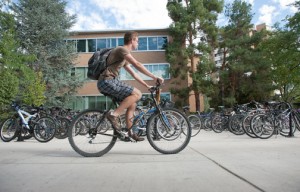
BYU Police hoped to raise awareness about bike safety on campus by holding the Y-Bike event on Friday, Sept. 11. With the recent changes in parking policy, more students are choosing to bus or bike to campus.
Sgt. Martin headed the bike awareness event. “I’ve seen an increase in students biking to school and only see it increasing in the future,” Martin said.
Mikey Caplin, a senior at BYU studying global studies, has been biking to school for the last two years.
“I bike to school because I bike everywhere, for many different reasons: it’s healthy, it’s fun, it saves on gas, it doesn’t pollute the world and I don’t have to deal with parking,” Caplin said. “I ride even in the winter. It’s a lifestyle, not a convenience thing.”
Caplin said he’s satisfied with the new pumps and bike-fixing stations that have been implemented on campus. “I think that’s awesome,” Caplin said. “A lot of progressive urban cities do that, and I know other universities do that, so I love that BYU has it.”
With the recent policy change in student parking, more students are switching to bikes to get to campus. Kevin Huefner, a senior studying international relations, has been riding his bike to school for the last two years.
“It’s not that far away from where I live, but it shaves off enough time that it’s worth it,” Huefner said. “Even if I have to get to campus and walk my bike, I can sit in my apartment for five more minutes, so it’s worth it.”
Huefner became comfortable with riding bikes on his mission in Sapporo, Japan.
“We were known as ‘the frozen chosen,’ so a lot of us rode bikes in the winter,” Huefner said. “Some of my mission buddies are more comfortable riding their bikes on ice than walking on it, just because that’s the way our mission was.”
Huefner believes more students should be making the switch. “The direction that BYU is going is almost making it harder to drive to school, which, if you only live 10 minutes from campus, why do you feel the need to drive?” Huefner said. “I think it’s silly. There are people from out of town that actually do need to drive.”
Reyna McGhie, a BYU junior studying nursing, has been biking since she was 16 years old. She was living in Holland at the time, and it was the most popular way of transportation, McGhie said.
“My bike is really awesome,” McGhie said. “It’s a Dutch bike, so you can even ride people on the back of it. That’s one perk — you can take a passenger. But it’s also cheaper than driving, and it’s faster than walking.” McGhie has no plans to switch back to driving her car to school.
But what do these veteran bike-riding students know about getting a bike safety checked? Huefner, McGhie and Caplin have never had their bikes safety checked, and they said they aren’t sure what it would entail.
“I assume safety check means checking the brakes, but what, do they whack your wheel with a hammer and say ‘Ok, your wheel’s not going to fall off?'” Huefner said. “I don’t know what that means. I think of bike safety as ‘I’m wearing a helmet and my brakes work.'”
Only one out of 10 students who ride bikes on campus knew what getting a bike safety checked meant.
“Getting your bike safety checked is really just checking the whole bike,” said Peter Fuller, an employee at Outdoors Unlimited. “We check the tire pressure, make sure your brakes engage quickly and that your gears all shift properly, among many other things.”




